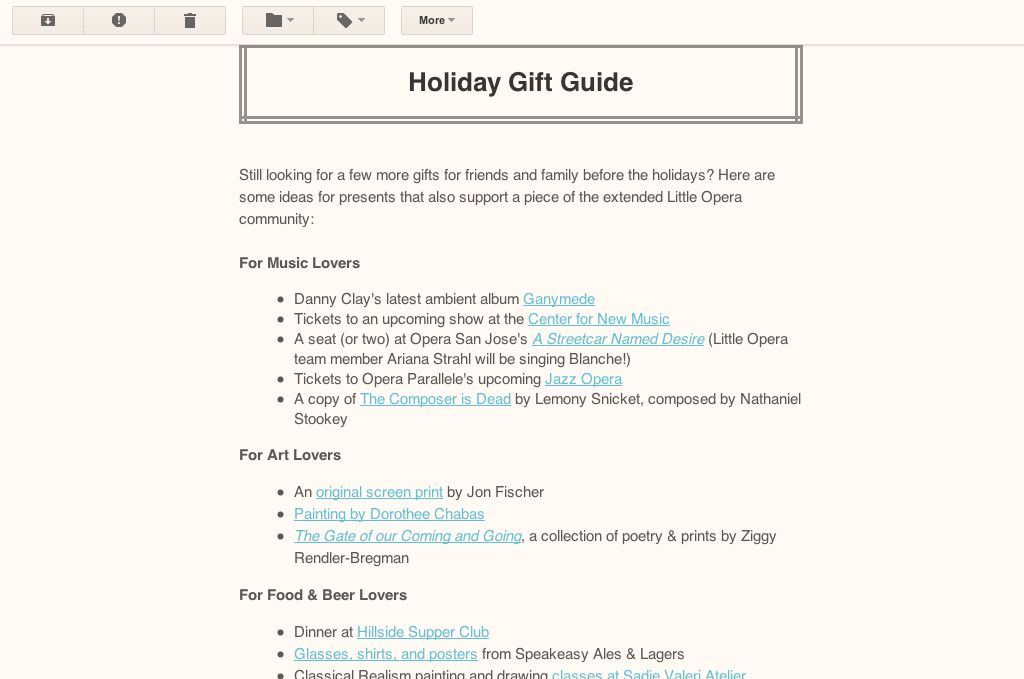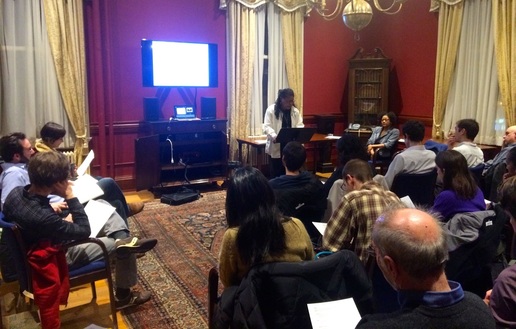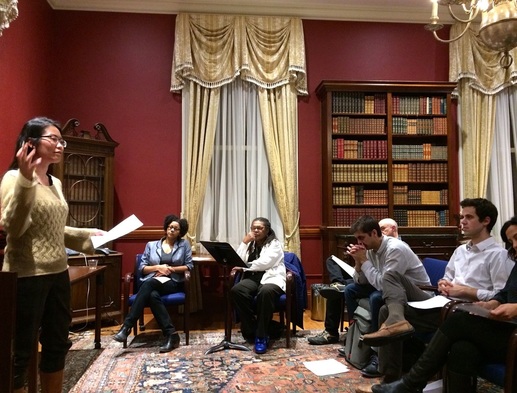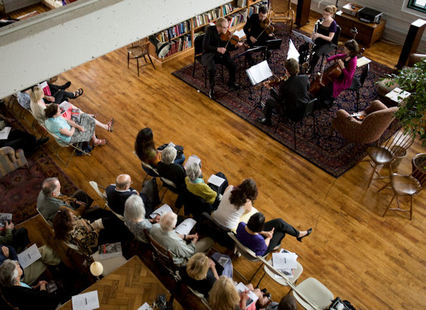|
As my inbox (and mail box) fills up with year-end solicitation messages from the organizations that I care about, I've been wondering about creative opportunities to 1. deepen the ties between an organization and its local community and 2. create a greater community benefit from these ties.
For instance, to assist me with my holiday shopping list, I would appreciate receiving an email from my favorite youth arts organization with a list of gift recommendations. I'm not talking about "please purchase our new tote bag." I'm looking for something more personal and meaningful, maybe along the lines of: 1. ________ is one of our favorite artists. He generously gives of his time to donate an annual workshop and performance for our students, like he did last month. His most recent recording (highly recommended by our staff!) is available for purchase at his website. 2. ________ donates flowers for many of our concerts each year. His floral arrangements are so beautiful, and we hope that you will visit his shop this month. 3. We think that ________ is one of the best chefs in our neighborhood. Two of her children participate in our after-school programs, and she volunteered to cater our most recent fundraising event. If you haven't yet, please give her new restaurant a try. Gift certificates are available. 4. The ________ Elementary School has been providing us with free teaching space for the past three years. We're very grateful for this relationship with Principal _______ and her staff. Their fifth grade students are holding their annual holiday cookie sale next week. We hope that you will consider stopping by and helping them raise money for the a playground structure. After all, since we're all in this together, let's find ways of creating a tide that lifts all boats. I'd love to receive this kind of inclusive holiday message from a community-based organization. Any takers? Update: Thank you, Little Opera, for giving this idea a try!
0 Comments
I'm sharing excerpts of responses to my mid-year written reflection prompts:
1. What's working well for you? 2. Can you cite one or more specific instances in which things that we talked about in class or individually were meaningful in your "real" life? 3. Can you provide an anecdote about how this experience has been meaningful, shaped your thinking or actions, or led to a new opportunity? “I feel I've gotten a lot out of this class, and especially from the presentations. It was great to talk through my ideas aloud, and have other people take them seriously!” “I came into this course attracted to the idea of building my own organization because I thought it would allow me artistic freedom and autonomy—I’d be able to imagine, design, create, and lead something. It’s clear to me now that 'freedom' is not the most helpful or important goal; I’d prefer meaning, connection, and positive impact.” “I already knew that my [community-based] work was extremely rewarding, but being able to pinpoint why that was and to verbalize my mission as an artist has deepened my desire to make this or similar projects a cornerstone element of my life and career.” “What's most valuable for me is the subtle shifts in outlook that I'm picking up along the way: the small ideological shifts that have helped me to claim greater ownership over my work through improved awareness and doing more of what's important to me in connecting with audiences.” “The importance of music’s connection with a community (a fundamental topic throughout our semester) is the only way to avoid creating music for nobody: music must have a meaningful role in our communities and it must be meaningfully shaped by our communities. How can we make these two things happen? Reflecting on the student presentations, it struck me that they could almost all be understood as answers to this question.” “I feel a sense of excitement walking around the city, knowing that at any moment I might have a chance to meet and connect with someone.” “Before this course, I’d never tried to clearly and broadly articulate an artistic mission or vision. I’m not satisfied with the missions or visions I’ve articulated, but I definitely have a clearer and stronger sense of what these should be, and I think I can now work more independently to refine these ideas. It’s been especially helpful to do this while also hearing lots of other musicians discuss and articulate their visions. This was the most important exercise of this semester, and while I still have a lot of work and thinking to do, I’m grateful to have been pushed to undertake it.” “My favorite part of this whole experience has been my one-on-one or small group meetings with you; the kinds of questions you asked encouraged me to think about my life in ways that I had been too hesitant to explore and have helped me to re-shape my goals for the next several years.” “I have always felt overwhelmed by the idea of long-term planning and previously had no idea where to start, but the concept of breaking down giant ideas into tiny, manageable steps and that [Andrew Simonet’s] ‘if a step makes you want to procrastinate, it’s too big’ was a revelation to me and has helped me to work towards large goals in a more tangible, productive way.” “This experience, and ones similar, has changed my thinking about being a leader. Leadership is not about knowing the answers or being more informed than your peers; it’s about listening, being humble and generous, and being a positive person.” And some constructive criticism for the future: “As you continue to develop this class over time, I think you might want to consider having two different sections: one for people who are already in the middle of a project, and one for those who just have the seed of an idea. I totally understand that one of your goals for the class was to gather together like-minded people and to help us connect with one another—but for me, the class time was disproportionately spent listening to each other fleshing out ideas and I felt like you had so many helpful and fascinating things to share which often ended up getting crammed in. By splitting the class in two, it might help the discussions to feel more relevant, and you could still combine the groups on occasion for guest speakers, presentations, etc.” On two successive Tuesday evenings in early December, each Boston-based participant had the opportunity to make a ten-minute presentation of his/her project, supplemented by a one-page handout (see Lysander Jaffe's Youth Harmony Project below), that consolidated the various topics covered throughout the first semester. I'm grateful to the NEC faculty, local practitioners, and friends and colleagues who joined us. We spent an additional ten minutes per presentation asking questions and offering constructive feedback. Expanding on this format, the year-end presentations are scheduled for April 12 and 26. Meanwhile, in Providence, mid-year presentations will occur on January 15, and final presentations are planned for May 27. Groupmuse, the popular platform designed to promote and facilitate Classical music house parties, is in the midst of a successful Kickstarter campaign. The for-profit company has raised more than its initial goal of $100,000 to fund administrative salaries.
Generally speaking, Groupmuse has received very favorable press coverage and encouragement because, in the words of founder Sam Bodkin, it seeks to "revitalize the role of classical music in contemporary society by emphasizing and accentuating its inherently social nature," as described to The Boston Globe. For those of us thinking deeply about the relevance--and sustainability--of musicians based in communities, there is plenty here about which to be excited. Meanwhile, over at Adaptistration, Groupmuse is receiving its first public examination from Drew McManus, a Classical music industry insider who likes "separating fact from fiction [and] interpreting spin." Drew is trying to find out what's really happening under the hood. You can read Drew's two recent posts about Groupmuse here and here. I'm not looking to comment on the concerns he raises. Rather, my goal is to introduce an idea into the Groupmuse model conversation that is especially relevant to participants in my community-based residency building course. One of the notable aspects of the Groupmuse business model that Drew highlights is the absence of shared financial risk. The musicians risk everything and Groupmuse risks nothing. Because musicians can conceivably walk away from a performance with little or no money in their pockets, this raises concerns about the potential for exploitation. After all, who are these musicians who can afford to participate in such an activity that doesn't guarantee any income? Still, Groupmuse appears to have good momentum and its Kickstarter campaign's success indicates a high degree of optimism for its future from those already involved. Therefore, musicians need to know how to use this model effectively. The question I want to address here is "How do you make the most of your Groupmuse performance opportunity?" Let's assume that musicians end up with zero net income after performing at a Groupmuse event. Why would they possibly feel good about having participated? Because, in the context of thinking about building a community-based residency, Groupmuse provides something incredibly useful: a free platform to access new social networks. The more credibility this platform accrues, the more widely it is shared, the greater its networking reach. Access to new social networks has tremendous value. Typically, musicians tend to socialize with other musicians. The potential game changer in one's social circle is that friend--not a musician--who is part of a different and, most likely, more affluent circle. Groupmuse provides the opportunity for musicians to build relationships beyond their own social circles, gaining personal connections to potential enthusiasts who they would otherwise have little likelihood of meeting. No matter how amazing the performers or the program, the challenge of bringing the audience out of their homes to engage with live music is always a big hurdle to overcome. Therefore, if my priority is to grow my tribe, I would trade that (half full) beautiful hall downtown for the opportunity to get in front of an eager audience of new faces packed into someone's living room. It's not about immediate income, even though that could also be an outcome under certain conditions. Ideally, for maximum effect, the musician(s) and the host(s) work in careful coordination to create a guest list, an atmosphere, and a program that best positions the musician(s) to make a successful fundraising pitch (including providing a vehicle for further engagement), either in support of their own artistic project or for a worthy nonprofit. Easily forgotten if too anonymous, it is incumbent on the musician(s) to be putting at least as much effort into personally connecting with the audience as they do into the performance portion of the event. I would certainly call this "accentuating its inherently social nature." Although it will require consistent attention and follow-through over time, any immediate financial gain from a Groupmuse event pales in comparison to the potential of long-term investments that cultivating and maintaining those relationships may yield. If I'm thinking about this from a personal sustainability angle, playing that Groupmuse event for free is significantly more attractive to me than playing in any other local venue that doesn't allow for such casual social interaction. After all, the real payoff may not necessarily come from the Groupmuse host. What about that really interesting person that the host introduced you to that led to a ten-minute conversation in the hallway about your interest in developing a residency in ________, who then invited you to perform a similar program at her home for all of her friends two months later... According to Drew McManus, Sam Bodkin stated that "when musicians perform at Groupmuse parties and maintain a profile at their site, the fundamental value is in the form of exposure and developing potential connections down the road for selling recordings or getting hired for non-Groupmuse private performances." That sounds right to me. This opportunity is potentially very valuable for musicians, so long as they understand the opportunity for what it is, and if they have developed the skills to make the most of it. Selling recordings is just the tip of the iceberg if your unit of measurement for success is years. Large cultural institutions definitely know the value of gaining privileged access to an audience of current and potentially new supporters in the intimate setting of a private living room. Now, through Groupmuse, freelance Classical musicians have their own platform to try out some donor cultivation strategies for themselves. Here is an example of S.W.O.T. analysis, courtesy of Josie Davis. This exercise helps you to evaluate your current situation. It's like getting your annual physical. What Strengths do you bring to the table? What Weaknesses? What Opportunities do you know about? Conversely, what Threats to your success do you anticipate?
STRENGTHS Professional resident musicians play at a high level and bring years of experience and education. Although teachers are encouraged to be creative in their teaching, everyone loosely follows the Suzuki method through Book IV. This creates a sense of community and shared purpose among students who grow to understand and appreciate the same music. Resident musicians are willing to take risks and are compassionate. OPPORTUNITIES There is a general interest in and support for the arts in Brunswick already. Rural communities in Maine (though not racially diverse), have a lot of diversity that is less visible: disparity in wealth, education, life-style, etc. The music school could serve as a converging place for diversity in the community. Establish a concert series in a town that doesn’t have regular access to classical music during the school year. Potential to tap into wealthy neighborhoods, professors, and summer population in Brunswick. Create a greater awareness and appreciation for the arts that can serve as a unifying force in the community. The program fills a niche that doesn’t exist in Brunswick - there is no formal music education program in the community. Possible partnership with Bowdoin College (opportunities for collaboration, use of facilities, etc.) Being situated in a small community raises the chances that people will become familiar with the organization. WEAKNESSES Stigma of classical music could be a barrier to involvement. Ability to reach the diverse community and pull in families that might not think of signing their kids up for music lessons. The focus of string instruction could be too narrow. Do we need to offer other instruments? Geography: Midcoast Maine is rural, which means families may have to travel a distance to participate in the program. There is no public transit. It’s hard to ask for money! Funding--can the program offer competitive pay to its teachers? THREATS The area might not be able to support the organization. It’s a small community. Is classical music relevant? Does Maine already have enough arts institutions? It’s a small state. See more on Josie's personal blog. |
AboutSharing student project documentation and, more recently, my own. Archives
June 2022
Categories |




 RSS Feed
RSS Feed
